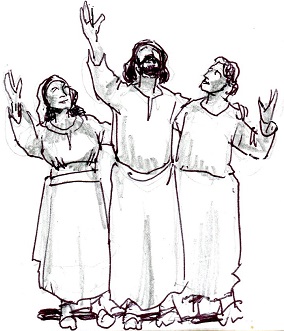

“This is how you are to pray” (Matthew 6:8).
Isa 55:10-11; Matt 6:7-15
The central prayer said twice daily by all Jews is the Sh’ma, the recitation of the Great Commandment from Deuteronomy and Numbers that proclaims the supremacy of God and the command to love God and neighbor. Jesus knew it by heart, lived it fully and based the Gospel message on it. When he taught his disciples how to pray, we hear the Sh’ma embedded in the “Our Father,” which invited them to call the supreme God “Abba,” an intimate name a child might use for “Papa,” or “Daddy.” The prayer focuses first on God and then on our relationships with our neighbors, especially regarding forgiveness.
The scribes and Pharisees had formal prayers and John the Baptist also taught his disciples to pray. The words of Jesus’ prayer must have struck others as overly familiar and even audacious for the implied claim that human beings could claim childlike access to a Being whose name was so sacred it was not to be pronounced. Yet, Jesus not only called God his Abba, he told his disciples to do so as well. Instead of giving them a formula, he invited them to step into his own relationship with God as “Our Father.”
The simplicity and directness of this address is contrasted with the “babbling” of the pagans, a reference to the Tower of Babel, an ancient tale about people who thought they could reach God with an immense Ziggurat, or pyramid. For their arrogance, they are scattered into many language groups and can no longer communicate with each other (Gen 11). It also recalls the time when Elijah challenged the prophets of Baal to call upon their god to send down fire on a sacrifice. He mocks them for their incessant chanting to waken their sleeping deity (1 Kgs 18).
For Jesus, God is neither distant nor asleep, but the very breath of life within us, the Source of our being and the Love that sustains us without ceasing. Like children calling out to a loving parent, we are immediately taken up into the arms of our heavenly Abba, who knows what we need before we ask. By trusting this love, we bring heaven to earth. God only asks us to love one another as God has already loved us. The one thing that can disrupt this constant flow of love is if we refuse to forgive. God’s name is Mercy, and we are in union with God and safe from evil when we fulfill our family identity as God’s children.
Today’s beautiful reading from Isaiah 55 illustrates the flow chart of love from God to us and through us to one another and back to God. Like the cycles of rain that water the earth and the seasons of sowing and harvesting that provide for us, so is God’s love sustaining us. Opening ourselves to this love is how we pray as Jesus did.
Advertisement








